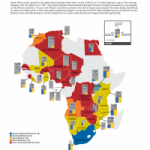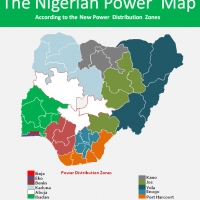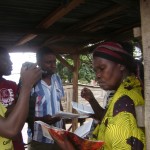The second in our series of guest posts by OKCon 2013 speakers is by Oluseun Onigbinde, Co-Founder/Lead Director BudgIT. He will be speaking at the Technology, Tools and Business session on Tuesday 17th September at 14:15, Room 13, Floor 2.
 A key consideration in driving open data across the entire literacy chain is how to maximize the attention of users that are mostly interested in other social activities? How does BudgIT, my startup, derive useful actions from our easily sidetracked users? I have formulated five lessons, that form the core of the BudgIT strategy and I hope it will be valuable for friends working in transparency and accountability.
A key consideration in driving open data across the entire literacy chain is how to maximize the attention of users that are mostly interested in other social activities? How does BudgIT, my startup, derive useful actions from our easily sidetracked users? I have formulated five lessons, that form the core of the BudgIT strategy and I hope it will be valuable for friends working in transparency and accountability.
1. Data must be Actionable:
The core principle that defines the way we present data lies in simplicity and the ability to inspire action. BudgIT presentations like infographics, interactive applications or data access are defined by the goal to initiate action. This approach is about making data analysis self-revelatory to citizens in order to enable civil society to ask clearer questions and to initiate plans for action.
2. Educate the Citizens:
 BudgIT operates in the developing country of Nigeria where literacy is of utmost concern. Citizens need background information to ask questions. This necessitates a clearer definition of the terms surrounding the data, and for these to be published in creative formats. Based on research, getting as detailed as possible in our description of the context surrounding the data is critical for building a mass of followers that understand the subject of discussion. As an example, public finance items such as recurrent or capital expenditure are put in simplified definitions to encourage a basic understanding by the users.
BudgIT operates in the developing country of Nigeria where literacy is of utmost concern. Citizens need background information to ask questions. This necessitates a clearer definition of the terms surrounding the data, and for these to be published in creative formats. Based on research, getting as detailed as possible in our description of the context surrounding the data is critical for building a mass of followers that understand the subject of discussion. As an example, public finance items such as recurrent or capital expenditure are put in simplified definitions to encourage a basic understanding by the users.
3. An Incentive for Citizens:
Open Data needs to be citizen-centred. There needs to be a focus to build open data that is relevant to the individual and that touches on basic things that matters to him/her. If open data and its visualisations stay at the macro level and are not focused on citizens, it may well communicate too little. At BudgIT, public finance data is crunched to the extent that the citizen is aware of capital projects and revenue allocations within his/her immediate neighbourhood. A citizen is much more likely to harness the power of data, properly ask questions, or trigger a debate when granted access to such personalized information.
4. Tell A Story:
 Data Access must tell a story in order to stimulate a larger interest within the community. With visualizations built around it, it must shine a light in ?dark [don’t know what a winded corner is?] corners. It must bring forth the human angle within the stories and it must do so by converting the stack of information into a moving narrative that stimulates a sense of belonging in the user. For example, we go beyond telling our users that Nigeria’s oil revenue equates to billions of US Dollars. For such data to be meaningful to citizens, who make less than $5,000 annually, we rather describe the purchasing power of such huge amounts of oil revenue in terms relating to pressing community needs.
Data Access must tell a story in order to stimulate a larger interest within the community. With visualizations built around it, it must shine a light in ?dark [don’t know what a winded corner is?] corners. It must bring forth the human angle within the stories and it must do so by converting the stack of information into a moving narrative that stimulates a sense of belonging in the user. For example, we go beyond telling our users that Nigeria’s oil revenue equates to billions of US Dollars. For such data to be meaningful to citizens, who make less than $5,000 annually, we rather describe the purchasing power of such huge amounts of oil revenue in terms relating to pressing community needs.
5. Get Feedback to Institutions:
Public data must be linked to a feedback system that allows citizens or users to reach elected officials, public servants and other stakeholders on the supply side. Debate, discussions and comments based on interactions with open data and its visualizations has to reach the required institution responsible for the data. As a creative open data startup, we have a feedback system in place that attaches itself to the head of the agency in charge of implementation, the legislator representing the area where the project is located and also the finance ministry expected to disburse the funds. Here lies the power of open data, when citizens believe that someone on the supply side gets connected with their concerns.
 The above points are derived from my thoughts on driving open data in Nigeria, in order to amplify the citizens voices in their demand for institutional reform and improved services. The core task lies in harnessing open data for public usage and how it drives us to institutional reform, inclusive growth and improved services. Open data is a correctional tool and an enabler for a society that requires transparency, accountability, institutional efficiency and improved citizen engagement. A lot of work is needed, both on the supply side and on the demand side, so that open data can translate itself into societal improvements.
The above points are derived from my thoughts on driving open data in Nigeria, in order to amplify the citizens voices in their demand for institutional reform and improved services. The core task lies in harnessing open data for public usage and how it drives us to institutional reform, inclusive growth and improved services. Open data is a correctional tool and an enabler for a society that requires transparency, accountability, institutional efficiency and improved citizen engagement. A lot of work is needed, both on the supply side and on the demand side, so that open data can translate itself into societal improvements.
Short Biography of Oluseun Onigbinde as posted on ashoka.org:
Oluseun Onigbinde has always been attached to the idea that data and research can be empowering mechanisms for change – something he credits his Engineering degree with confirming. After spending years in the financial sector providing critical analysis of budgets and strategic research to help banks perform better, Oluseun decided it was time to take a risk and apply these same principles to building a better country. But instead of providing analysis to managers of government, he thought that the key is to provide this budget analysis to the general public. Recognizing that the data does not actually come alive unless communicated effectively, Oluseun spends as much time focusing on data analysis as on finding creative and relevant ways to present and disseminate it.

